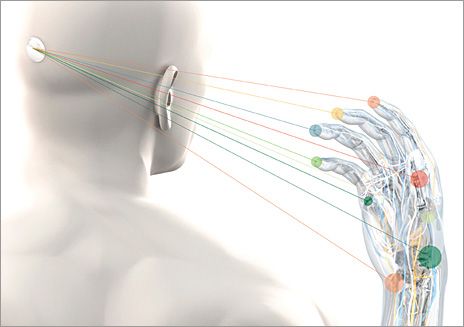Imagine a piece of technology that would let you control an apparatus simply by thinking about it. Lots of people, it turns out, have dreamed of just such a system, which for decades has fired the imaginations of scientists, engineers, and science fiction authors. It’s easy to see why: By transforming thought into action, a brain-machine interface could let paralyzed people control devices like wheelchairs, prosthetic limbs, or computers. Farther out in the future, in the realm of sci-fi writers, it’s possible to envision truly remarkable things, like brain implants that would allow people to augment their sensory, motor, and cognitive abilities.
That melding of mind and machine suddenly seemed a little less far-fetched in 1999, when John Chapin, Miguel Nicolelis, and their colleagues at the MCP Hahnemann School of Medicine, in Philadelphia, and Duke University, in Durham, N.C., reported that rats in their laboratory had controlled a simple robotic device using brain activity alone. Initially, when the animals were thirsty, they had to use their paws to press a lever, thus activating a robotic arm that brought a straw close to their mouths. But after receiving a brain implant that recorded and interpreted activity in their motor cortices, the animals could just think about pressing the lever and the robotic arm would instantly give them a sip of water.
Suddenly, a practical brain-machine interface, or BMI, seemed attainable. The implications were enormous for people who, because of paralysis caused by spinal-cord or brain damage, find it difficult or impossible to move their upper or lower limbs. In the United States alone, more than 5.5 million people suffer from such forms of paralysis, according to the Christopher and Dana Reeve Foundation.
The Hahnemann-Duke breakthrough energized the BMI field. Starting in 2000, researchers began unveiling proof-of-concept systems that demonstrated how rats, monkeys, and humans could control computer cursors and robotic prostheses in real time using brain signals. BMI systems have also revealed new ways of studying how the brain learns and adapts, which in turn have helped improve BMI design.
But despite all the advances, we are still a long way from a really dependable, sophisticated, and long-lasting BMI that could radically improve the lives of the physically disabled, let alone one that could let you see the infrared spectrum or download Wikipedia entries directly into your cerebral cortex. Researchers all over the world are still struggling to solve the most basic and critical problems, which include keeping the implants working reliably inside the brain and making them capable of controlling complex robotic prostheses that are useful for daily activities. At the risk of losing its credibility, the field now needs to transform BMI systems from one-of-a-kind prototypes into clinically proven technology, like pacemakers and cochlear implants.


-

Former Member
-
Cancel
-
Vote Up
0
Vote Down
-
-
Sign in to reply
-
More
-
Cancel
Comment-

Former Member
-
Cancel
-
Vote Up
0
Vote Down
-
-
Sign in to reply
-
More
-
Cancel
Children